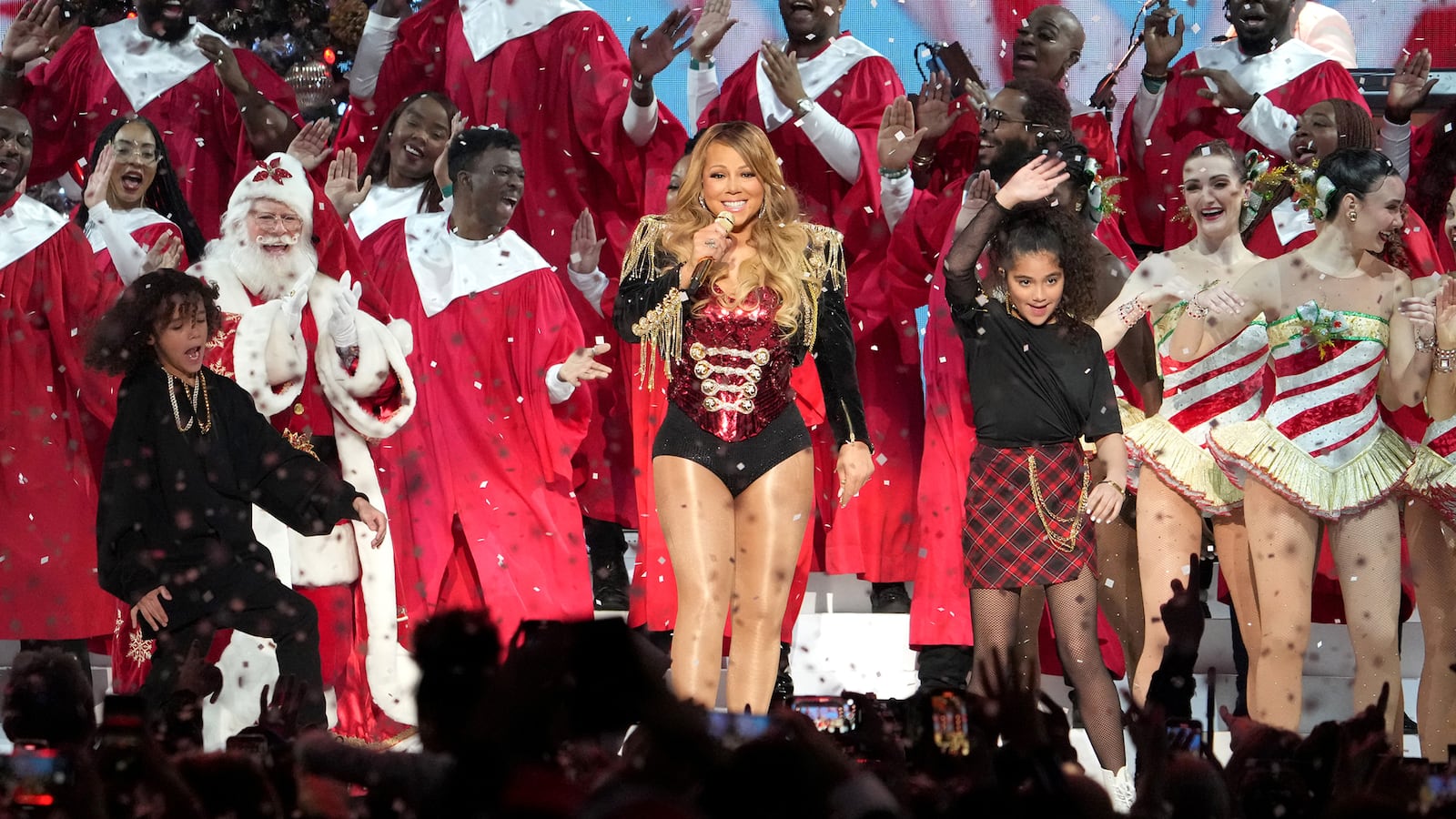On the eve of Nov. 1, Mariah Carey released her fifth annual “It’s Time” video reel, announcing the coming of the holiday season and thereby granting the world permission to start listening to (her) Christmas music. This year’s edition featured Carey frozen in a block of ice. At the strike of midnight on the first, Mimi shatters her way out of the ice with the power of her whistle register, as ghoulish jack-o’-lanterns back away from her in awe.
At one point in time, Carey used to complain about those who called for the premature onset of the Christmas season. But I guess the public’s impatient insistence on listening to her music as early as possible wore her down and made her give in. This is not the only example of Carey caving to the rampantly unruly waves of holiday hype. While in 2021 she refused the title of “Queen of Christmas”—claiming that it belongs to the Virgin Mary—a year later, she’d had a change of heart and attempted to trademark the phrase (only to be thwarted by “full-time Christmas singer-songwriter” Elizabeth Chan).
Whether or not she can legally (or spiritually) wear the crown, Carey has effectively earned it: just look at her slew of holiday singles, two holiday studio albums, plus soundtracks to her two TV specials. And most of all, there’s her world-famous hit “All I Want for Christmas is You”—which, on top of being remixed three times after the release of the 1994 original (the 2011 “SuperFestive!” version with Justin Bieber, the 2020 “Make My Wish Come True” version, and my personal favorite, the 2000 “So So Def” remix featuring Lil Bow Wow and Jermaine Dupri), has as of 2022 earned her over $72 million, and continues to rake in an additional $3 million with each consecutive year.
And just when you thought she was getting tired, she announced the 13-city “Merry Christmas One And All” tour this holiday season.
Mariah Carey is among the hardest-working people in the music industry, and surely she deserves her flowers. But I think it’s time that someone says, respectfully, that the oversaturation of Christmas content has gotten out of hand, and that perhaps, it’s time for her to hang it up.
Before you come for me, let me defend myself: I’m a devout “Lamb,” and I only say this out of love for our Queen. My fear is that as she keeps harping on the yuletide spiel and riding the wave of her holiday music success in order to maintain her relevance, she runs the risk of occluding the greatness of her body of work—especially the earlier material—which is what makes her one of the greatest musical artists of our time.
It’s no secret that Carey is one of the bestselling artists ever, with the second-most Billboard No. 1 hits of all time (she has 19, right behind the Beatles’ 20). But the reality is, except for the Lambs and some old-heads, younger listeners are likely unable to name any of those songs—except perhaps for “We Belong Together,” “Hero,” and thanks to recent samples by Latto and Drake, “Fantasy” and “Emotions,” respectively.
Surely many people respect Carey for her five-octave range and signature whistle register, as well as her notorious persona as an arch-diva. But how many people know that she has written and produced the vast majority of her songs—a skill that those she is often compared to, like Celine Dion and Whitney Houston, couldn’t boast themselves? In 2012, she won the BMI Icon Award for Songwriting, and in 2022, she was recognized for her craftsmanship by being inducted (quite belatedly, if we’re being honest) into the Songwriters Hall of Fame.
Furthermore, how many people realize the extent to which she forever changed the landscape of pop music? With her release of “Fantasy Remix” featuring ODB in 1995, Carey was the first to popularize the R&B-singer-featuring-rapper pop-crossover trend, which paved the way for hits by duos like Ashanti and Ja Rule, Beyoncé and Jay-Z, Rihanna and Drake, Janet Jackson and Busta Rhymes, and Ariana Grande and Big Sean. Her unique mix of pop, hip-hop, R&B, and gospel music was innovative for her time, breaking gender and racial barriers by creating her own lane on the pop charts and forging a path for countless others.
Carey deserves respect as a singer, writer, producer, overall diva, and, above all, as a human being who’s gone through her fair share of hardships, suffering racism, abuse, and scrutiny by the press (much of which she detailed in her excellent 2020 autobiography). I’ll always be indebted to her music for helping me at my lowest points and leading me further along my own journey toward self-discovery.
None of this to say that Carey’s Christmas music is not up to par. She’s churned out some real holiday gems, namely “Joy to the World,” “O Holy Night,” “When Christmas Comes,” and “Miss You Most (At Christmas Time).” But at the end of the day, the writing is on the wall. Her holiday hijinks have become excessive, and only distract the public from the fact that she’s a versatile and gifted artist who is much greater than the meme she has turned herself into.
Of course, it’s understandable for a superstar of her caliber to fear fading into irrelevance, especially after having spent over half of her life in the spotlight. But my dearest Mariah, your work and legacy are more than timeless. I say this as a lowly subject under the reign of your queenship. It’s time for you to celebrate the fruits of your labor. Enjoy your time with your kids and loved ones. Make your famous shortbread Christmas cookies and go on your annual reindeer ride in the snow with Roc and Roe. But please, for the love of Jesus (at least as a favor for him on his birthday), stop churning out endless Christmas content. We’ve had enough.







